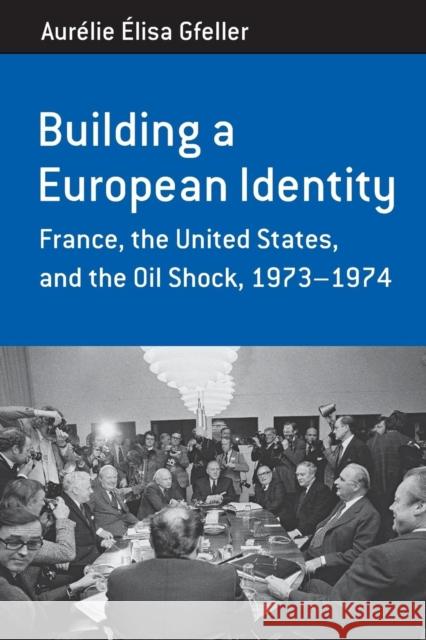Building a European Identity: France, the United States, and the Oil Shock, 1973-74 » ksi─ů┼╝ka
Building a European Identity: France, the United States, and the Oil Shock, 1973-74
ISBN-13: 9781782386889 / Angielski / Mi─Ökka / 2014 / 242 str.
Building a European Identity: France, the United States, and the Oil Shock, 1973-74
ISBN-13: 9781782386889 / Angielski / Mi─Ökka / 2014 / 242 str.
(netto: 128,78 VAT: 5%)
Najni┼╝sza cena z 30 dni: 134,94
ok. 30 dni roboczych
Bez gwarancji dostawy przed ┼Ťwi─Ötami
Darmowa dostawa!
..".this is a valuable addition to the existing literature on the impact of the October 1973 energy crisis on French national policy, the evolution of the European Community, and the nature of the transatlantic relationship." - American Historical Review "In contrast to most recent studies on the "Year of Europe," Aurelie Gfeller has meticulously mapped the discussions at the Quai d'Orsay and used a variety of other French document collections as well as French newspapers." - Diplomacy & Statecraft "The author offers much new information...She deepens substantially our understanding of very difficult moments in European history in the 1970s...through] a very lively and well documented presentation of French vigorous anti-American politics and of Kissinger's rash, dubious, and aggressive judgments of French policies." - Perspectivia.net "Aurelie Gfeller's text makes an original contribution to the analysis of French foreign policy making. A combination of archival research and clear prose sheds new light on the roots of nascent European political cooperation in the 1970s... She argues convincingly that, notwithstanding the short-lived nature of the Euro-Arab dialogue itself, this early chapter of European foreign policy cooperation bequeathed significant longer-term legacies for European policy coordination." - David Styan, Birkbeck College ..". a good piece of work. The author adds important new insights into a crucial period in the development of European integration and does so in a fashion that is not afraid to advance challenging and controversial arguments... While at heart a national study which adds importantly to our understanding of European policy making in Paris, Gfeller's work is an exemplary piece of international historical research." - Piers Ludlow, London School of Economics ..". an important contribution to understanding the evolution of French policy in the construction of Europe during a critical moment, 1973-74.... The approach is revisionist in the sense that it challenges previous interpretations of these years as essentially static ones in the construction of Europe, and France's role as obstructing, or at least delaying progress toward a greater European voice in international relations." - John Kim Munholland, University of Minnesota The Arab-Israeli war of 1973, the first oil price shock, and France's transition from Gaullist to centrist rule in 1974 coincided with the United States' attempt to redefine transatlantic relations. As the author argues, this was an important moment in which the French political elite responded with an unprecedented effort to construct an internationally influential and internally cohesive European entity. Based on extensive multi-archival research, this study combines analysis of French policy making with an inquiry into the evolution of political language, highlighting the significance of the new concept of a political European identity. Aurelie Elisa Gfeller is a Swiss National Science Foundation Ambizione research fellow and a visiting lecturer at the Graduate Institute of International and Development Studies in Geneva, Switzerland.
"...this is a valuable addition to the existing literature on the impact of the October 1973 energy crisis on French national policy, the evolution of the European Community, and the nature of the transatlantic relationship." ┬Ě American Historical Review"In contrast to most recent studies on the "Year of Europe," Aur├ęlie Gfeller has meticulously mapped the discussions at the Quai dOrsay and used a variety of other French document collections as well as French newspapers." ┬Ě Diplomacy & Statecraft"The author offers much new information...She deepens substantially our understanding of very difficult moments in European history [in the 1970s...through] a very lively and well documented presentation of French vigorous anti-American politics and of Kissingers rash, dubious, and aggressive judgments of French policies." ┬Ě Perspectivia.net"Aur├ęlie Gfellers text makes an original contribution to the analysis of French foreign policy making. A combination of archival research and clear prose sheds new light on the roots of nascent European political cooperation in the 1970s... She argues convincingly that, notwithstanding the short-lived nature of the Euro-Arab dialogue itself, this early chapter of European foreign policy cooperation bequeathed significant longer-term legacies for European policy coordination." ┬Ě David Styan, Birkbeck College"... a good piece of work. The author adds important new insights into a crucial period in the development of European integration and does so in a fashion that is not afraid to advance challenging and controversial arguments... While at heart a national study which adds importantly to our understanding of European policy making in Paris, Gfellers work is an exemplary piece of international historical research." ┬Ě Piers Ludlow, London School of Economics"... an important contribution to understanding the evolution of French policy in the construction of Europe during a critical moment, 1973-74.... The approach is revisionist in the sense that it challenges previous interpretations of these years as essentially static ones in the construction of Europe, and Frances role as obstructing, or at least delaying progress toward a greater European voice in international relations." ┬Ě John Kim Munholland, University of MinnesotaThe Arab-Israeli war of 1973, the first oil price shock, and Frances transition from Gaullist to centrist rule in 1974 coincided with the United States attempt to redefine transatlantic relations. As the author argues, this was an important moment in which the French political elite responded with an unprecedented effort to construct an internationally influential and internally cohesive European entity. Based on extensive multi-archival research, this study combines analysis of French policy making with an inquiry into the evolution of political language, highlighting the significance of the new concept of a political European identity.Aur├ęlie ├ëlisa Gfeller is a Swiss National Science Foundation Ambizione research fellow and a visiting lecturer at the Graduate Institute of International and Development Studies in Geneva, Switzerland.











